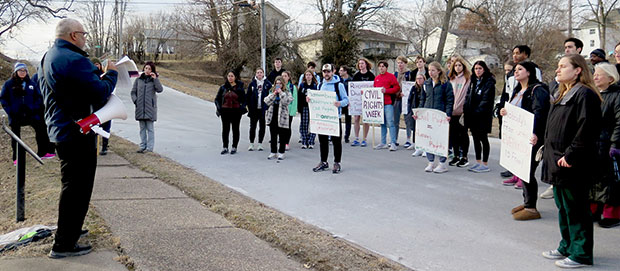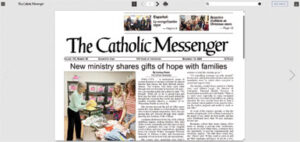
Ryan Saddler, left, St. Ambrose University-Davenport’s associate vice president for Diversity, Equity and Inclusion, speaks to March to Remember participants Jan. 27 in Davenport.
By Anne Marie Amacher
The Catholic Messenger
DAVENPORT — “March to Remember,” a silent march commemorating the Civil Rights movement and St. Ambrose College’s (now university) role in it kicked off the university’s weeklong 2025 Civil Rights Celebration Jan. 27.
Dozens of students, faculty and staff gathered in the lower level of Cosgrove Hall to begin the march. Fritz Dieudonne, coordinator of Student Diversity, Equity and Inclusion for St. Ambrose, provided examples of the university’s role in the Civil Rights movement.
Among the examples: in the 1950s, St. Ambrose worked on poverty-fighting efforts at Cook’s Point in Davenport, such as helping to build new homes that included plumbing. Four students and a faculty member participated in the march from Selma to Montgomery, Alabama in 1965.
“Our history is so rich,” Dieudonne said, encouraging students to check out the Civil Rights marker outside Christ the King Chapel on campus that informs people of St. Ambrose’s role in advocating for the rights of others. Seven other Civil Rights markers have been erected in Davenport.
University Chaplain Father Dale Mallory blessed the group before they started the silent march from Cosgrove Hall to Ripley and 11th streets in Davenport. Several carried signs that provided information about the silent march and civil rights.
They stopped at a Civil Rights marker identifying the significance of Toney’s Barber and Beauty Shop. Ryan Saddler, the university’s associate vice president for Diversity, Equity and Inclusion, talked about Charles and Ann Toney. Charles was the first African American student at St. Ambrose College. Although he did not graduate from there, he worked his way up at John Deere Company starting in the foundry and later becoming dean of Affirmative Action. Charles also operated a barbershop and Ann, a beauty shop. Bill Cribbs, who later became the City of Davenport’s Affirmative Action Officer, barbered with Charles in the evenings.
The Civil Rights marker for Toney’s Barber and Beauty Shop states, “This shop was an informal place for Civil Rights activists from 1961-1976…. Their customers (of Charles and Bill) and fellow Civil Rights workers gathered to discuss and plan civil rights activities, including actions taken by the Catholic Interracial Council and the NAACP.”
After the marchers returned to Rogalski Center on campus, Saddler encouraged them to attend other celebrations on campus that week. On Jan. 28, Saddler shared highlights from the lives of some individuals active during the modern Davenport Civil Rights Movement.
Also during the week, Tulisa Bollinger spoke about opportunities for service and “paying it forward.” Father Mallory presided at a Civil Rights and Human Liberties Mass in the chapel. Other presentations addressed poverty, housing and diversity. The week concluded with a concert-opera titled “Omar’s Journey, which told the story of a West African scholar enslaved in South Carolina.









